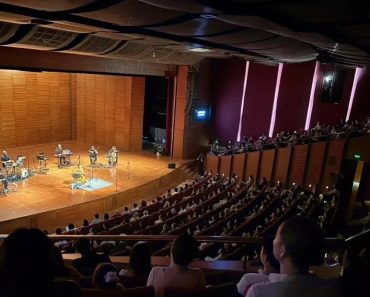Omar Faruk Tekbilek’s concerts are a sort of mystical universal communion. Deeply influenced by Sufism, a branch of Islam that seeks a mystical connection with the divine, Tekbilek’s music and song is in large measure devotional, influenced by Sufi poets like the unsurpassed Rumi.
He is a master of all the traditional folk instruments of Turkey and the broader region (like Azerbaijan): everything from the ney, a small reed flute, to the qaval, which is somewhat similar to the tambourine.
Tekbilek is undoubtedly one of the most important exponents of Eastern music in the West (he has lived in Rochester, New York for decades and has been the recipient of numerous prizes).
There is also a mystical, unspoken harmony between Tekbilek and the other members of his ensemble, one of whom is his son. He insists that he never tells them what to do, and that a synergy emerges naturally.

In an exclusive, hour-long free-wheeling conversation with To Vima International, Tekbilek comes across as a man with a child-like heart and a gushing love and admiration for all God’s Creation, from humankind to nature and the universe. According to his Sufi precepts, all these things are within the human being, not outside of us, and are best understood that way.
The brotherhood of humankind and perpetual peace are the philosophical underpinnings of both his music and his thought.
Tekbilek still cherishes the friendly relationship he enjoyed with the late great Greek composer Mikis Theodorakis, who called his own self-styled belief system about the divine “Universal Harmony”, a concept that is hardly alien to Sufism–or to music in general, of course.
Both believed deeply in Greek-Turkish friendship.
Tekbilek ended all three of the concerts he gave in Greece this year with four songs by Theodorakis sung by female vocalists.
“Sufism is, to me, firstly the realization that there is a universal mind, something awesome,” he declares.
Let’s start with your musical beginnings. What were the first sounds you heard that brought with them the realization that you were falling in love with music? Which genre of music attracted you first?
My two older brothers were musicians. So I heard the little kaval (another type of flute used in Turkish/Balkan music) and the smaller ney, and then the saz and the tzoura (long-necked, plucked stringed instruments).

Tekbilek has developed a style that builds on traditional Sufi music while incorporating inspiration from ambient electronic musicians, most notably Brian Keane.
Was this all based on Ottoman music?
Ottoman music, which we call classical music, was the music that flourished in the Sultan’s palace. But I always mention the ethnic pluralism of this musical tradition when I conduct seminars and workshops. Since the Ottoman Empire was big, there were musicians from different backgrounds, so there were Turks, but also Armenian and Jewish composers, who all contributed to what we call Turkish classical music.
So, you embarked on a long journey with this folk music. Tell us, what were the major way-staged along that journey of exploration?
I studied this kind of music through my first mentor. He had a music store. He called me when I was 11 years old, because I played the kaval, and not too many people do. So I became like his son to him and learned my first lessons from him. I learned all the scales and the rhythms from him, and how to recognize the notes. And then when I moved to Istanbul when I was 17 years old, I met another three of my life’s great teachers. One of them was Orhan Gencebay, who was a very famous bağlama composer.
The third major influence in my life was Aka Gündüz Kutbay. I learned Sufi philosophy from him, but also the secret of how to blow, about how important it is to be aware of my breath. He told me, “You’ve got to blow all the way out. When you feel the urge, then stop and start again, you can never realize that tension in your breath.” It’s just like a yogic tradition: we must become aware of our breathing. To this day, this exercise is an inherent part of his organ playing.
Are there different approaches to Sufism?
People define what Sufism is in many different ways. Many of them say, “just quit the world of possessions,” but there are thousands, or at least hundreds, of different definitions. But the way I understand it, Sufism is two main things to me:
Firstly, the realization that there is a universal mind that is awesome and cannot be comprehended, which we call God, Tammuz, Brahma or whatever. The existence of the cosmic mind is the first realization.
Second is loving all of Creation, because of the Creator. This love affair come out through the music, in divine songs and divine melodies. Chanting and singing are very important, because all musicians have been priests since ancient times, because they were aware of the vibration, because music is vibration. Now quantum physics also says that everything is vibration, that the whole universe is composed of vibration.
As a person, as Omar, do you wish for social change?
It has been getting more obvious to me over the last 10 years: that I am the truth. That every individual is the truth. Only I am and exist. Only I am responsible. What is the world supposed to be? Everything I look to as an ideal achievement outside of myself, I must bring into being myself. I don’t expect anything from outside. We create the future… though there is no future, because we are always in the now.
I want to ask you about a great poet who is extremely important in Sufism and whose work is intimately connected with Sufi music, the poet Rumi. Do you play music that’s based on his poetry or related to him?
Yes, of course, he’s a great man, and I am inspired by him. Actually, in the concert, I sang two songs based on his poetry, one of which I composed myself.







